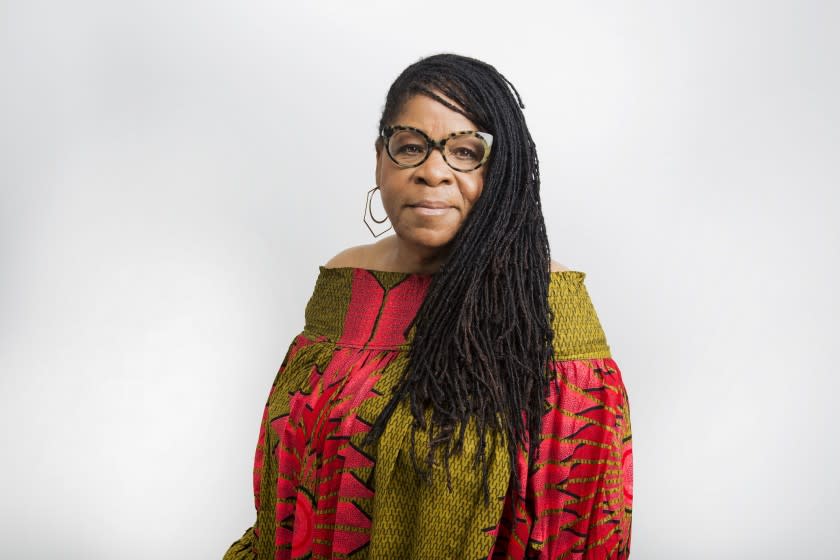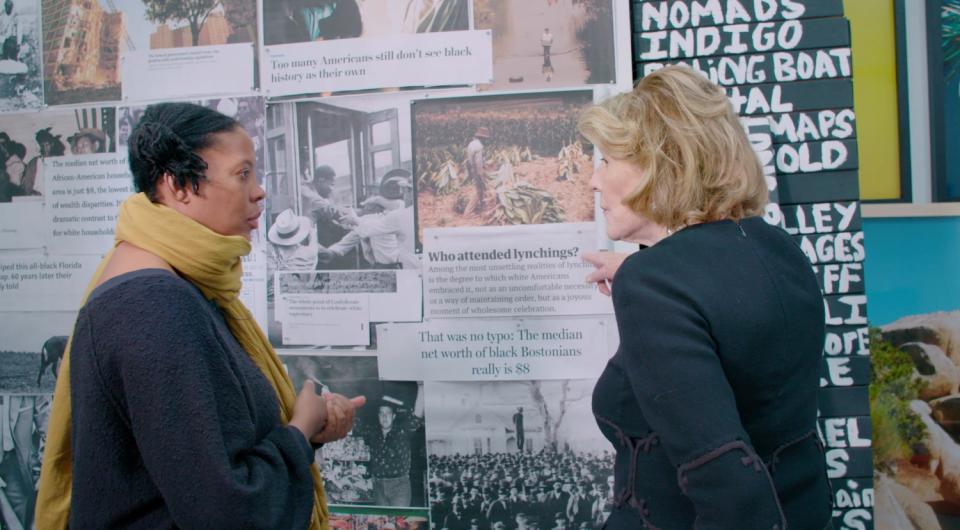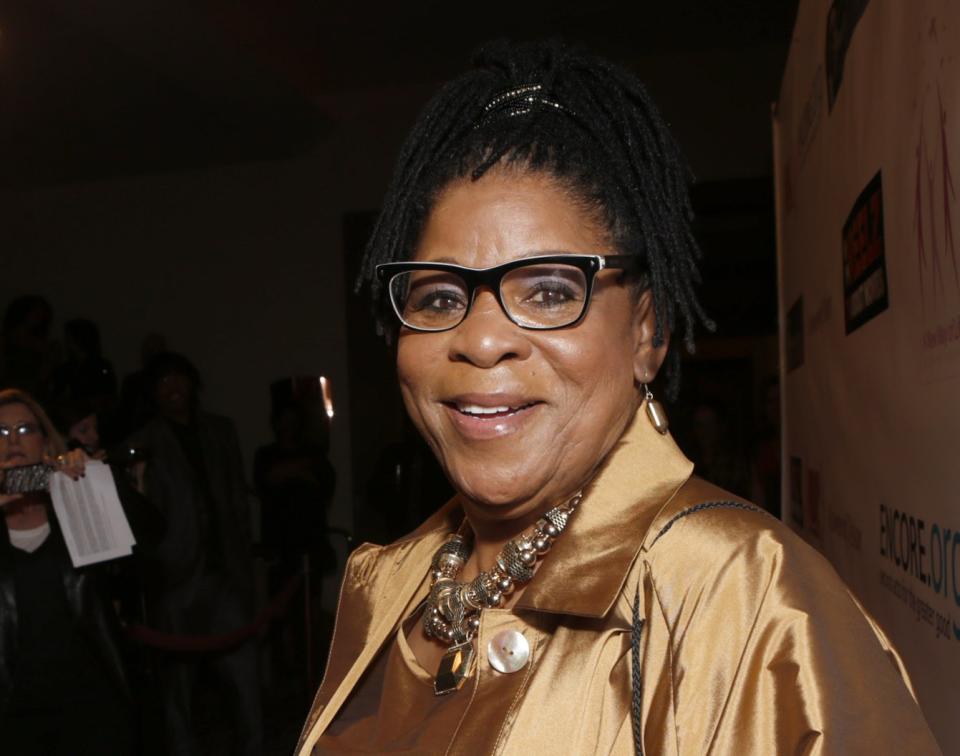This L.A. activist went to jail. Now she runs a film fest that puts justice on trial

In Susan Burton's living room in Compton, there hangs a piece of art: a picture of a little Black girl with watery eyes in a tattered white dress. She holds a Bible, and verses from it rain down around her.
"I think art has the ability to depict information and imagination, to show beauty, and to show the history of the nation and the world," Burton says. "It's an expression."
The activist and author relates to art differently now that she has seen "Aggie," one of the five films featured at this month's Justice on Trial Film Festival. The annual event is run by A New Way of Life Reentry Project, a Watts-based nonprofit that helps women rebuild their lives after prison. Burton oversees the organization as its founder and president.
"Aggie" tells the story of Agnes “Aggie” Gund, who sold Roy Lichtenstein’s Pop Art painting "Masterpiece" for $100 million to found the Art for Justice Fund, which addresses mass incarceration in the U.S. Gund, Burton says, expanded her own interpretation of art — and who gets to enjoy it.

The virtual Justice on Trial Film Festival will take place Thursday through Sept. 21, with one film screened online per night. Tickets are free and can be found on the festival's website, along with showtimes.
The festival, now in its eighth year, uses films and panel discussions to highlight people impacted by the justice system. This year's lineup will feature the documentaries "Pushout," "Belly of the Beast," "The Third Strike" and "The Gathering." Animated shorts created by incarcerated artists from the Hidden Lives Illuminated Project will be shown before each film.
Burton herself went to prison six times for drug-related offenses before seeking help at a Santa Monica treatment facility. In 1998, she founded A New Way of Life, and three years ago she chronicled her journey in a book, "Becoming Ms. Burton: From Prison to Recovery to Leading the Fight for Incarcerated Women." Last year, Gov. Gavin Newsom granted Burton a pardon.
Burton, 69, recently talked to The Times about why this year's Justice on Trial offerings are as timely and relevant as ever.

How do movies — and Hollywood at large — portray the justice system and those incarcerated in it?
Historically, there hasn't been an accurate portrayal of the justice system. More recently … the truth of the atrocities of our justice system have been shown. So the Justice on Trial Film Festival gives us a real picture, through the documentaries that our filmmakers have made. But it seems as though the big-budget films have a way of [portraying] the justice system as being true and accurate. And it depicts the most horrific of crimes and … people feel as though this is the real reality of people and of the justice system. Detectives just [go for] the most convenient suspect and label them, and it's not true. And we see that with many of the people who have been freed after spending decades and decades and decades incarcerated. We can look at the [Central Park] Five and see that.
We can look at the work of Bryan Stevenson [portrayed by Michael B. Jordan in "Just Mercy"]. And that's one of the recent films that's been made about [this], that was a big-budget film. But the Justice on Trial Film Festival saw all of these different films being made by struggling filmmakers who really wanted to tell the truth and really wanted to show viewers what really happens … in our justice system. So, through a conversation with Michelle Alexander, the author of "The New Jim Crow," we had a conversation about her book and about documentaries. And we came up with the Justice on Trial Film Festival.
Have you seen any fictional Hollywood films that you think do a decent, fair job of portraying the justice system?
I have not seen — and that doesn't mean it's not out there — but I have not seen any fictional Hollywood films that give an accurate portrayal of the justice system. The other thing I want to make clear … is that I'm not saying that there are not atrocities on one side, but there are not as many atrocities as there are portrayed to be.
It sounds like you think Hollywood is dramatizing these issues too much.
Yeah. Dramatizing and painting a picture of Black folks in a way that's not accurate. … I can think of one film that comes to mind right now, that I just felt like did not give [an] accurate portrayal — there's scenes that keep with the tone of how ruthless and how hard Black men are. And that was a scene in the movie "Harriet" [about Harriet Tubman]. And in the movie, there was a scene where this Black man stomped this Black woman to death. And it just kept with the mantra of how "deadly" and "vicious" Black men are. And I wonder where that scene came from. And it was a real turnoff for me.
Before each film, you're showing short films made by incarcerated artists from the Hidden Lives Illuminated project.
I've been back to that prison in Pennsylvania. And I talked with those men. And many of those men claim innocence. And Hidden Lives portrays the talent that's locked away. The promise of individuals that have been locked away in cages. And these are innocent people; they claim to be innocent. I care to believe that some of them are innocent. But even beyond their innocence, the amount of years that they've been inside is ridiculous.

Those short films reminded me of a magazine article by Audre Lorde, "Poetry Is Not a Luxury," which made me wonder: Is art a luxury for incarcerated or formerly incarcerated people?
Art has been something that I have viewed as a luxury. And I view it as a luxury because I was so busy to survive, so focused on trying to survive life, that I didn't have the ability to step back and to absorb art. So now that I'm able to absorb art, I see it as a necessity.
Is it possible to bring art to incarcerated folks?
It is possible. And I think it's a necessity to help people to develop a lens of healing. And a lens of expression. And a lens of hope.
Are those the criteria that you used to pick films for the festival?
Every film that goes into the film festival must have a social justice lens and needs to expose either a solution to mass incarceration or an issue connected to mass incarceration. So our theme is exposing injustice. And showing solutions.
You appear in the first film, “Pushout,” as an expert on educational discipline against Black girls. What was that experience like?
I had an experience that I write about in my book, "Becoming Ms. Burton," of being a 12-year-old going on 13-year-old girl in my first year of junior high. And I got pushed out of school because my dress, the principal said, was two inches too short. And so it was kind of full circle for me to be able to tell that story that happened 50 years ago. And has escalated. And I just thank [screenplay writer] Monique Morris for exposing it, and calling it what it is.
Friday night features "Belly of the Beast," a documentary about reproductive injustice. Have you experienced failures of reproductive justice in your own work?
Yes, I have. I've seen women who have came to A New Way of Life, and one woman, I remember distinctly, had been given a hysterectomy while incarcerated. And during the hysterectomy, the surgeon accidentally sliced her liver, and she was on medication for the rest of her life. Not only did she have a hysterectomy, she got a bad surgery. And she was on medication, and it just stunned me: This woman, how horrible her medical procedure was.

This has been an ongoing problem, but right now there's discussion about forced sterilization happening in Immigration and Customs Enforcement facilities.
It's barbaric how people are treated inside, and [Tuesday] night at my inspection [of the county jail system, working with the Sybil Brand Commission], I had to see that stuff. It's horrible to see. And I can bring it to the light, but what type of resources will be put to work into that? What kind of justice? So there's the injustice. But there's injustice on top of injustice.

